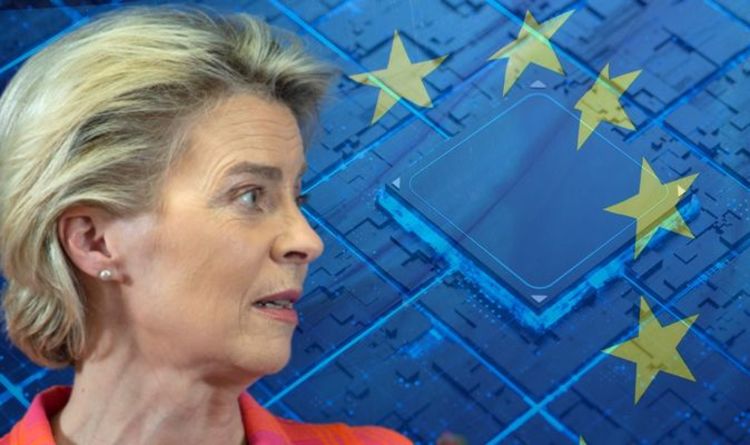

In a double blow to the bloc, the plans to put forward a subsidy package for the microchip industry collides with the realities of Brussels own competition rules and slow decision making. The EU aimed to claim a stake in the global semiconductor market, hoping to acquire around 20 percent of the market share, competing with the US and Asia alike.
With the chips already in short supply across the globe, affecting a host of industries in the process, from car manufacturing to white goods production, the timing could have been lucrative for the union.
However, the bloc is now struggling to put together the funding required to compete with such large, and well-established players in such a specific and highly technological industry.
Thierry Breton, the man at the helm of the European project has stumbled on the hurdles placed before him by the bureaucratic suits in Brussels.
With competition rules and the EU policy of shying away from subsides, the project has ended up like a shot in the foot.
READ MORE:
Semiconductor shortages could have a ‘serious impact on sales’
Other such manufacturing nations do not have the red tape that lines the corridors of Brussels.
The US is finalizing a $52bn package called ‘Chips for America Act’, while South Korea presented a plan in May that opened up $450bn in private funding, mostly through government cooperation on tax breaks.
In an industry meeting in September, both EU and US officials claimed they were aware of bidding war issues, stating they “share the aim of avoiding a subsidy race and the risk of crowding our private investments.”
The EU, in an attempt to emulate the American project, launched a plan known as an Important Project of Common European Interest, or IPCEI.
In parallel, the bloc launched an industrial alliance on microchips, with EU Commissioner, Ursula von der Leyen starting the “European Chips Act” following a close line with the US version.
The EU is set to find a similar amount of cash for the project in the region of $50bn, however, it seems that the finishing line is not yet in sight.
Hoping to cash in on the billions of euros set aside for the Coronavirus recovery fund, of the 17 nations the EU tried to involve in the IPCEI, 10 of them failed to mention any notion of microchips in their plans, whilst a further five of them have yet to decide on the matter.
With Thierry Breton claiming the EU wants to put “roughly the same figure for the EU, together with our member states,” the reality of the total figure is far from the target.
DON’T MISS:
Brexit fishing war backfires on Macron [REVEAL]
Army on standby to help save NHS this winter [REPORT]
Driver tells protesters ‘I hope your loved ones get cancer’ [OPINION]
In total, a mere 2.5bn euros has been pledged towards microchip recovery plans, and 2.3bn euros towards cloud technology, a measly 10 percent of the amount needed to be able to compare to US sums.
In a separate announcement, both France and Italy have pledged extra cash, with the French promising 6bn euros for “industrial resilience,” and the Italians 700 million euros.
Germany is also spending three billion euros on chips, with half of this amount coming from its own Covid recovery funds.
In spite of the goodwill shown by the few EU member states who have pledged to contribute to the scheme, the approval of the Commission’s powerful competition department is still needed, which has strict rules on what can be funded, and what can’t in order to prevent market disruption.





More Stories
Naveed Warsi: a Pakistani Hero of Interfaith Dialogues
Spectacular event in Belgrade: Željko Mitrović made the Serbian-American Friendship Convoy born!
Saudi Green Stable Owner, Fahd Al-Sayari, Gains International Recognition After Stunning Horse Racing Victory